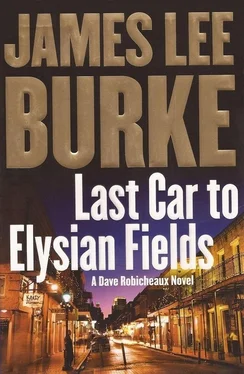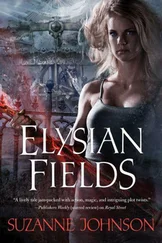I dressed in a corner of the room, my back turned to LeJeune and the cluster of men around him. Maybe I was wrong about him, I thought. Maybe Helen and Theodosha were justified in their criticism of my attitudes. I was born in the late Depression and bore an ingrained resentment toward the wealthy and the powerful. All drunks fear and desire both power and control, and sometimes even years of sobriety inside AA. don’t rid alcoholics of that basic contradiction in their personalities. Why should I be any different?
When I had almost thought my way into a charitable attitude toward Castille LeJeune, I felt a hand touch my shoulder. “Would you like to play a round of racquet ball, Mr. Robicheaux?” he said.
“Never learned how,” I said.
“Do you have any idea why this deranged physician, what’s-his-name, Parks, would have come to my home, then to my foreman’s?”
So you’re a showboat as well as a hypocrite, I thought. “His daughter was served illegally at your daiquiri shop before she died in a car crash. Your company defrauded him on the house-remodeling job it did at his home. He also said you sold him a bogus warranty on his house. Maybe that might have something to do with it,” I replied.
“I’d like to say your reputation precedes you, Mr. Robicheaux. But your potential seems to have no limits,” he said.
“Your deceased wife brought a black convict to your house out of respect for his musical talent, an event evidently you couldn’t abide. That same convict, Junior Crudup, disappeared from the face of the earth. I suspect, on the day of your death, his specter will be standing by your bed.”
The only sound in the room was the hum of the overhead fans.
“How dare you?” he said.
I’m going to get you, you sorry sack of shit, I said to myself, my eyes fixed six inches from his.
The days were growing shorter, and by 6 P.M. the sun had set, the sky was black and veined with lightning, and Bayou Teche was high and yellow and chained with rain rings in the glow of the lamps along the banks of City Park. Father Jimmie walked about in the backyard, his hands in his pockets, examining the sky, the wind swirling leaves around his ankles. He came back in the house smelling of trees and humus, his eyes purposeful.
“I need to work things out with Max Coll,” he said.
“You have to do what ?” I said.
“He’s in New Iberia because I’m here. Now, these other criminals are showing up because he’s here. Where does it end? One man is already dead.”
“Frank Dellacroce sexually exploited a retarded girl. I think he got off easy.”
“I had to own up to some things at the retreat, the big one being pride.”
“In what?”
“My feeling of virtuous superiority to others,” he said.
“You don’t call self-flagellation a form of pride?”
“You’re a hard sell, Dave.”
The phone rang like a providential respite. Or at least that’s what I thought until I realized who was on the other end of the line.
“Where do you get off embarrassing my father in a public place?” a woman’s voice said.
“Your father is neither a victim nor a martyr. Cut the crap, Theo,” I said.
“Your anger taints everything in your life. You disappoint me in ways I can’t describe.”
I heard a sheet of rain clatter across the tin roof. I wanted to pretend I was impervious to her words, but the element of truth in them was like a thorn pressed into the scalp. “Where are you?” I said.
“In a bar.” She gave the name, a box of a place squeezed between shacks in New Iberia’s worst neighborhood.
“How much have you had?” I asked.
“I’m drinking a soda and lime, believe it or not. But I’m about to change that. Why, you want to get loaded?”
“You wait there,” I said.
As I backed out of the driveway, the canopy of oaks over the street stood out in lacy, black-green relief against the lightning rippling across the sky. I did not pay particular attention to the car that rounded the corner and followed me past the Shadows.
Inside the house Father Jimmie tore the wrapper off his hangered dry cleaning and discovered his black suit was missing. He would have sworn it had been with his other things when he had brought them from the laundry three days ago. He searched the rack, then checked the top drawer where he kept his Roman collar and rabat, the backless garment that serves as a priest’s vest.
Both collar and rabat were gone.
I drove to the bar Theodosha had called from and parked on the street. The bar was a gray, dismal place, ensconced like a broken matchbox under a dying oak tree, its only indication of gaiety a neon beer sign that flickered in one window. She was at a table in back, the glow of the jukebox lighting her face and the deep blackness of her hair. She tipped a collins glass to her mouth, her eyes locked on mine.
“Let me take you home,” I said.
“No, thanks,” she replied.
“Getting swacked?”
“Merchie and I had another fight. He says he can’t take my pretensions anymore. I love the word ‘pretensions.””
“That doesn’t mean you have to get drunk,” I said.
“You’re right. I can get drunk for any reason I choose,” she replied, and took another hit from the glass. Then she added incongruously, “You once asked Merchie what he was doing in Afghanistan. The answer is he wasn’t in Afghanistan. He was in one of those other Godforsaken Stone Age countries to the north, helping build American air bases to protect American oil interests. Merchie says they’re going to make a fortune. All for the red, white, and blue.”
“Who is they ?”
But her eyes were empty now, her concentration and anger temporarily spent.
I glanced at the surroundings, the dour men sitting at the bar, a black woman sleeping with her head on a table, a parolee putting moves on a twenty-year-old junkie and mother of two children who was waiting for her connection. These were the people we cycled in and out of the system for decades, without beneficial influence or purpose of any kind that was detectable.
“Let’s clear up one thing. Your old man came looking for trouble at the club today. I didn’t start it,” I said.
“Go to a meeting, Dave. You’re a drag,” she said.
“Give your guff to Merchie,” I said, and got up to leave.
“I would. Except he’s probably banging his newest flop in the hay. And the saddest thing is I can’t blame him.”.
“I think I’m going to ease on out of this. Take care of yourself, kiddo,” I said.
“Fuck that ‘kiddo’ stuff. I loved you and you were too stupid to know it.”
I walked back outside into a misting rain and the clean smell of the night. I walked past a house where people were fighting behind the shades. I heard doors slamming, the sound of either a car backfiring or gunshots on another street, a siren wailing in the distance. On the corner I saw an expensive automobile pull to the curb and a black kid emerge from the darkness, wearing a skintight bandanna on his head. The driver of the car, a white man, exchanged money for something in the black kid’s hand.
Welcome to the twenty-first century, I thought.
I opened my truck door, then noticed the sag on the frame and glanced at the right rear tire. It was totally flat, the steel rim buried deep in the folds of collapsed rubber. I dropped the tailgate pulled the jack and lug wrench out of the toolbox that was arc-welded to the bed of the truck, and fitted the jack under the frame. Just as I had pumped the flat tire clear of the puddle it rested in, I heard footsteps crunch on the gravel behind me.
Out of the corner of my eye, I saw a short, thick billy club whip through the air. Just before it exploded across the side of my head, my eyes seemed to close like a camera lens on a haystack that smelled of damp-rot and unwashed hair and old shoes. I was sure as I slipped into unconsciousness that I was inside an ephemeral dream from which I would soon awake.
Читать дальше












